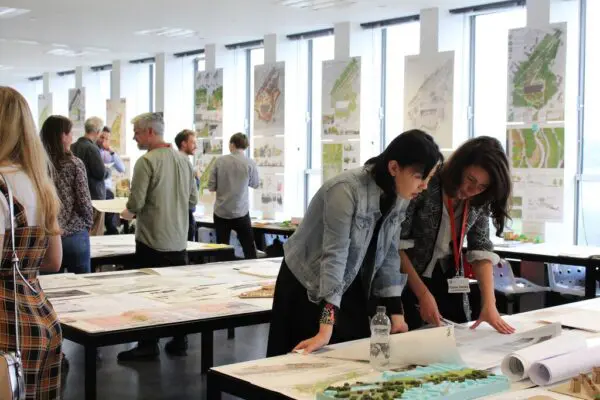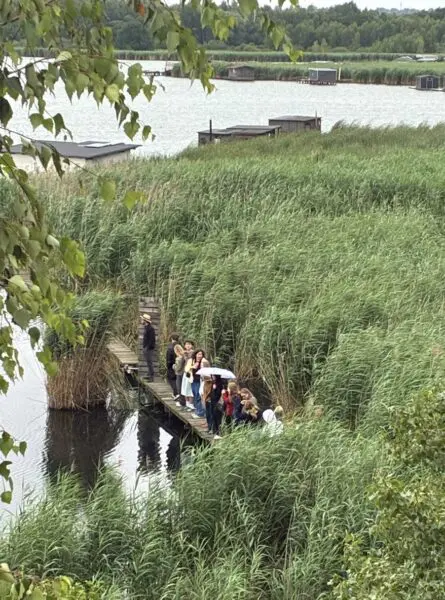
Oslo, Norway
Norwegian Architecture, Urban Planning and Design
When:
28 June - 23 July 2027
Credits:
10 EC
Read more
Architecture
When:
19 August - 02 September 2023
School:
Institution:
Bauhaus-Universität Weimar
City:
Country:
Language:
English
Credits:
3 EC
Fee:
890 EUR

Discover the various aspects of the built environment and learn how to develop more resilient cities!
In this two-week intensive course, you will get a deep insight into the influence of human-made and natural factors on the built environment and develop responsive planning schemes for more resilient cities. You will learn about various aspects of urban resilience from an environmental as well as a cultural perspective, using different tools, scientific methods, and analysis, including GIS techniques.
How to encounter natural hazards with reactive urban spaces
Faced with the robustness and readiness of our built environment and the challenges for society to cope with the vulnerability of these circumstances, urban resilience is often difficult to assess when it comes to its integration and implementation in everyday reality. In order to take unexpected occurrences of natural hazards – such as earthquakes, floods or droughts – into account and to become reactive in the built space, disciplines related to spatial development are increasingly important.
Acquire an interdisciplinary and transcultural perspective for an integrated urban design approach
Next to the building-related knowledge about vulnerability and preventive or adaptive measures, the process and acceptance of these measures are depending on cultural values. In this course, the overarching topic of urban resilience will therefore be treated with a transcultural perspective. Furthermore, the process of change that forms the cultural landscapes for urban resilience requires an interdisciplinary approach that takes diverse aspects for building schemes and planning processes into account. In this course, you will learn how to develop such an integrated urban design approach.
From basic knowledge to specific case studies
The course includes lectures on more general approaches to integrated urban development and urban sustainability but also takes a closer look at urban resilience in the context of climate-sensitive planning by analysing urban heat islands and different building typologies and urban patterns. Part of the programme is GIS training and application to map such heat islands of informal and formal housing areas, using a practical, illustrative case study. Based on these findings, you will get the chance to create practical design solutions that respond to urban heat in the physical, cultural, and social context.
Dipl.-Ing. (FH) Philippe Schmidt M.Sc. - Head of Workshop Dr. Conrad Philipp - Cooling Singapore Initiative Eng. Mohamed Abdel Aziz, M.Sc. - GIS & Urban Planning Expert Dr.-Ing. Hassan ElMouelhi, M.Sc. - Technische Universität Berlin,
Students (Bachelor from 6th semester & Master) of disciplines related to spatial development like architecture, landscape architecture, engineering, urban and spatial planning, cultural, social , economic geography, development and others.
Previous knowledge:
- Interest to work in a holistic and interdisciplinary way on urban settlements and the urban environment.
- Basics in GIS are desirable (no condition) and/or CAD.
- Good knowledge of English language.
Technical requirements:
- Writing and sketching material, explorative mind
- Laptop with the following software for Geographical Information Systems:
Quantum GIS (QGIS) free download http://www.qgis.org/de/site/ AND
ArcGIS student trial: http://www.esri.com/landing-pages/software/arcgis/arcgis-desktop-student-trial
Please note:
- Some preparatory material (texts and a small task) will be sent out to participants 4 weeks before the course starts.
The course content at a glance
The course will systematically approach an understanding of urban resilience that both connects man-made as well as natural conditions in the urban context, including scales from the urban to the building level.
- Setting parameters for urban resilience
- The complexity of Integrated Urban Development Concepts and the realities
- Analytical approaches to urban heat islands (neighbourhood level and larger)
- Societal ideals and the impact of urban green on the urban environment
- Drawing out a comparative study between informal and formal settlements
- Learn how affected areas can be connected to user-oriented systems
- Consequences from the case study for integrative planning schemes
Next to planning in an interdisciplinary and transnational context, the workshop offers different options to learn about different approaches and urban typologies and to assess them in a broader perspective for finally being able to shape and design in different geographical and cultural systems.
Fee
890 EUR, 2 weeks (90 hrs) The course fee is 890 EUR.
Fee
690 EUR, 690 EURO for students & alumni. 350 EURO for BUW students. The course fee includes: - Orientation & Support - Programme according to description - Teaching materials - Bauhaus Summer School ID card - Daily Lunch at the University Cafeteria (Monday - Friday) - Certificate - Internet access at the Bauhaus-Universität Weimar - Free use of library - Accompanying programme including excursions - Free entrance to museums belonging to Klassik Stiftung Weimar The course fee does NOT include: - Travel costs - Accommodation - Insurance - Additional module(s) (190 €)
When:
19 August - 02 September 2023
School:
Institution:
Bauhaus-Universität Weimar
Language:
English
Credits:
3 EC

Oslo, Norway
When:
28 June - 23 July 2027
Credits:
10 EC
Read more

Sheffield, United Kingdom
When:
20 July - 31 July 2026
Credits:
5 EC
Read more

Ostrava, Czechia
When:
06 June - 10 June 2026
Credits:
3 EC
Read more